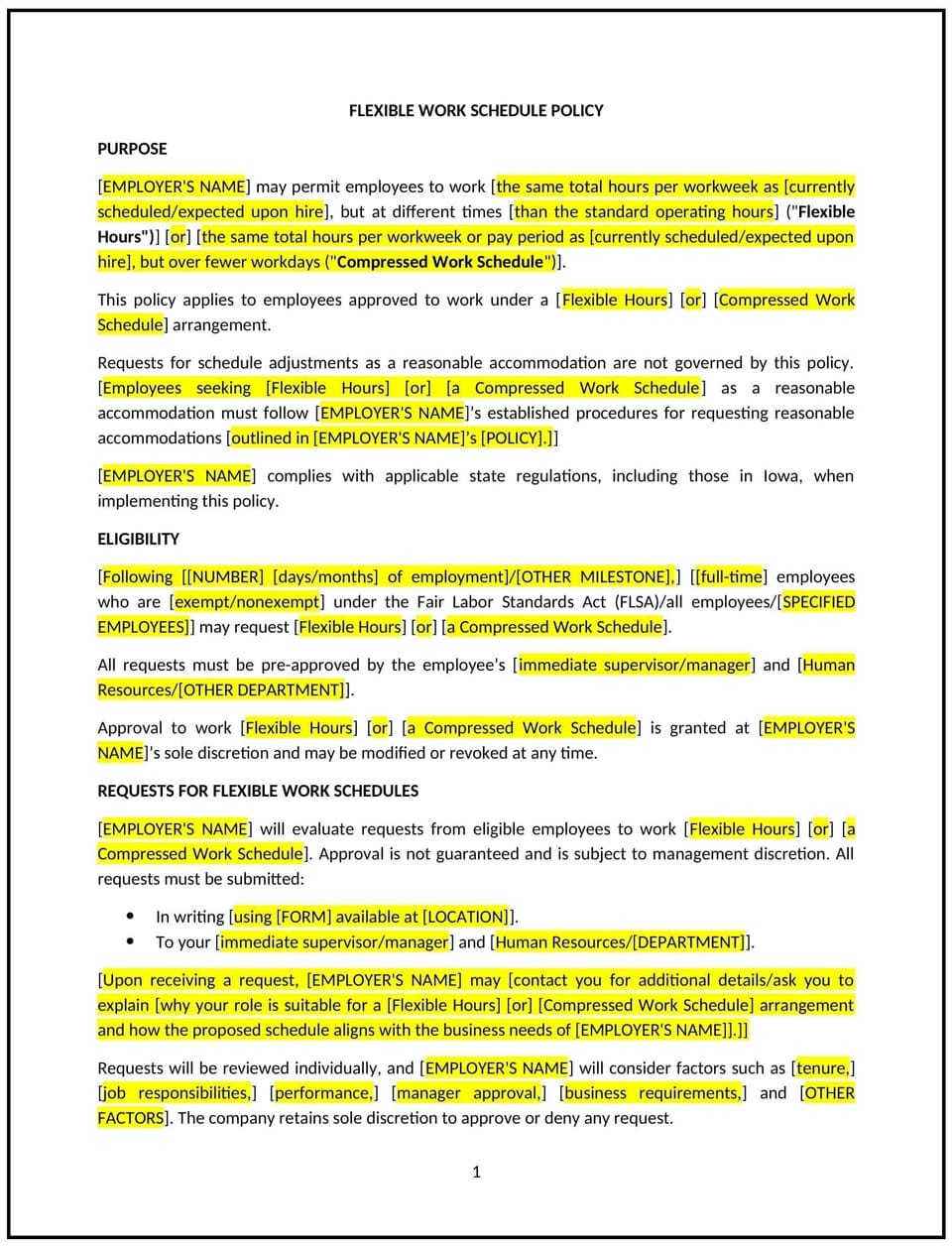Flexible work schedule policy (Iowa): Free template

Flexible work schedule policy (Iowa)
A flexible work schedule policy helps Iowa businesses provide employees with the opportunity to modify their work hours or work remotely, based on operational needs and individual preferences. This policy supports work-life balance, increases employee satisfaction, and helps businesses attract and retain talent. A flexible schedule also allows businesses to accommodate different working styles while maintaining productivity.
By implementing this policy, businesses in Iowa can promote a positive work environment, improve employee retention, and offer flexibility without sacrificing performance or business goals.
How to use this flexible work schedule policy (Iowa)
- Define eligibility requirements: Identify which employees or departments are eligible for flexible schedules and any minimum requirements, such as tenure or job type.
- Establish clear guidelines: Outline how flexible work arrangements will operate, including specific hours employees can work, remote work policies, and any required in-office presence.
- Set expectations for availability: Specify expectations regarding employee availability during core business hours or for meetings, ensuring flexibility does not disrupt operations.
- Provide guidelines for remote work: If remote work is an option, establish expectations for communication, performance, and availability while working from home.
- Set up a request process: Define the procedure for requesting flexible work arrangements, including the required notice period and any necessary approvals.
- Include performance metrics: Establish performance metrics to ensure that flexible arrangements do not impact productivity or outcomes.
- Review and update: Regularly evaluate the policy to ensure it meets the changing needs of the business and the workforce.
Benefits of using this flexible work schedule policy (Iowa)
This policy offers several key benefits for Iowa businesses:
- Enhances employee satisfaction: Offering flexibility helps employees achieve better work-life balance, leading to improved morale and job satisfaction.
- Increases employee retention: Flexible work schedules can help businesses attract and retain top talent, especially in competitive job markets.
- Supports business continuity: Flexible scheduling allows businesses to adapt quickly to unforeseen circumstances or changing operational needs.
- Improves productivity: Giving employees the autonomy to choose when and where they work can lead to more focused, efficient work.
- Reduces absenteeism: Employees are less likely to take unplanned leave if they have the flexibility to adjust their schedules to accommodate personal needs.
- Promotes diversity and inclusion: Flexibility can help support a more diverse workforce by accommodating different needs and lifestyles.
Tips for using this flexible work schedule policy (Iowa)
- Communicate clearly with employees: Businesses should ensure that employees understand the policy and its guidelines before implementing flexible work arrangements.
- Review regularly: Businesses should periodically review the policy to ensure it remains aligned with operational goals and workforce needs.
- Use performance-based metrics: Businesses should focus on performance rather than the number of hours worked, allowing employees to work flexibly while meeting expectations.
- Ensure fairness: Businesses should apply the policy consistently to all eligible employees and avoid favoritism when granting flexible work arrangements.
- Monitor outcomes: Businesses should track the effectiveness of flexible work arrangements by assessing productivity, employee satisfaction, and business results.
Q: Why should Iowa businesses implement a flexible work schedule policy?
A: Businesses should implement a flexible work schedule policy to improve employee satisfaction, reduce turnover, and foster a more adaptable and productive work environment.
Q: Who is eligible for flexible work schedules?
A: Businesses should define eligibility based on factors such as tenure, job type, and business needs, ensuring that the policy is fair and meets operational goals.
Q: What types of flexible work arrangements can be offered?
A: Businesses should offer a variety of flexible work arrangements, such as remote work, adjusted hours, compressed workweeks, or flexible start and end times.
Q: How should businesses handle requests for flexible work schedules?
A: Businesses should establish a formal request process that includes clear steps for employees to follow, such as submitting requests with adequate notice and seeking approval from their manager.
Q: Will employees be required to work core hours under a flexible schedule?
A: Businesses should specify any core hours or availability expectations to ensure that flexible schedules do not disrupt team collaboration or client interactions.
Q: How will remote work be managed under this policy?
A: Businesses should set clear expectations for remote work, including communication protocols, performance metrics, and availability during working hours.
Q: How can businesses ensure the policy is fair and applied consistently?
A: Businesses should apply the policy consistently to all eligible employees and avoid favoritism. Regular reviews can help ensure fairness and transparency.
Q: How often should businesses review their flexible work schedule policy?
A: Businesses should review the policy periodically to ensure it remains effective, aligned with business needs, and adaptable to changing circumstances.
This article contains general legal information and does not contain legal advice. Cobrief is not a law firm or a substitute for an attorney or law firm. The law is complex and changes often. For legal advice, please ask a lawyer.


